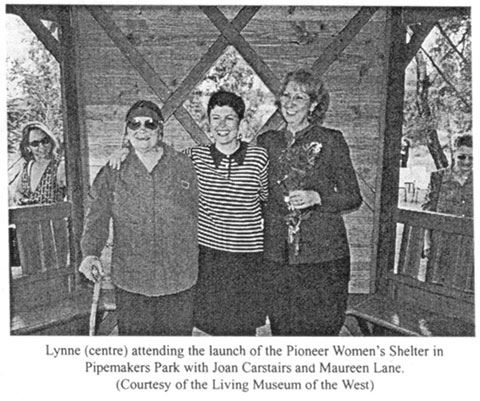Panel 4: Politics – You can get some things done through politics
Joan Kirner
Joan Kirner has been a community activist with and on behalf of women for many years. Joan’s story began in Croydon. There she worked for better quality and greater equity in pre-schools and schools. She then moved into the State and National scene as an effective advocate for parents in decision-making in State Schools. In the 1970s she became president of both the Victorian Federation of State School Parents Club and the Australian Council of State School Organisations. She was awarded an Order of Australia for her services to the community. Joan became a Member of Parliament in 1982. In 1988, she became the Minister of Education. In 1990, she became the first woman Premier of Victoria. She left Parliament in 1994. She is still very involved in community issues. She is currently the co-convenor of EMILY’S list, an organisation set up to encourage more women to participate in politics. She is also co-author with Moira Rayner of the Women’s Power Handbook.
My father gave me the sense of what achievement is about. It wasn ‘t a question of achievement just for yourself. It was achievement for other people that was important.
At home, my father came in from work at five o’clock, expecting tea on the table at 15 minutes past the hour -chops, steak or sausages, mashed potatoes, green peas and apple pie with cream. Dad and I drew the line at brussel sprouts.
(Gandolfo manuscript)
The Ladies Benevolent Society opening prayer. (Courtesy of Mrs Morley)
Photograph of Joan Kirner and Moira Rayner by Michael Clayton-Jones (Courtesy of The Age)
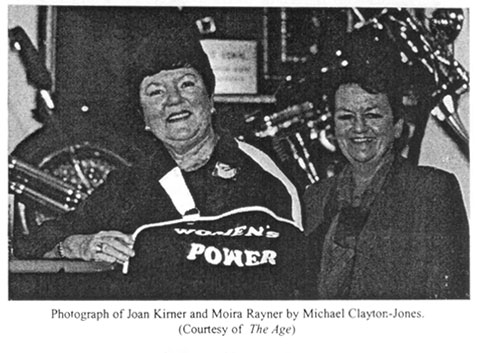
Margaret Tucker
Margaret Tucker – Lilardia – was born in 1904 on an Aboriginal settlement on the New South Waies – Victoria border. At age 13, she was taken away from her family and sent to a ‘training school’ which was a mission station for children. Marg grew up living in and around the ‘Cummera’ (Cummeragunga) Mission Station in New South Wales, near Echuca. This happened during the time of the assimilation policies and the Aboriginal Missions and Reserves Act. One of the aims of the Aboriginal Act in 1957 was to ‘help’ Aboriginal people ‘assimilate’ to become a part of the Austialian society. Later in her life Marg moved to the western suburbs of Melbourne. Marge combined work and entertaining as a performer with being a mother and working with the Australian Aborigines League. Marg Tucker worked at the munitions factory during the Second World War. Margaret received an MBE for her services to the Aboriginal community.
I got work at Kinnears rope works in Footscray, a huge place. The boss, a tall fair man. interviewed me and asked me if I was Italian.
We need to put aside our grievances and think positively how to put right what is wrong in Australia today, to forgive past mistakes and to create a leadership that can help our country help the world. Australia can be a pattern for the whole world in the way we live, especially in bridging the gap between black and white.
[If Everyone Cared. M Tucker)
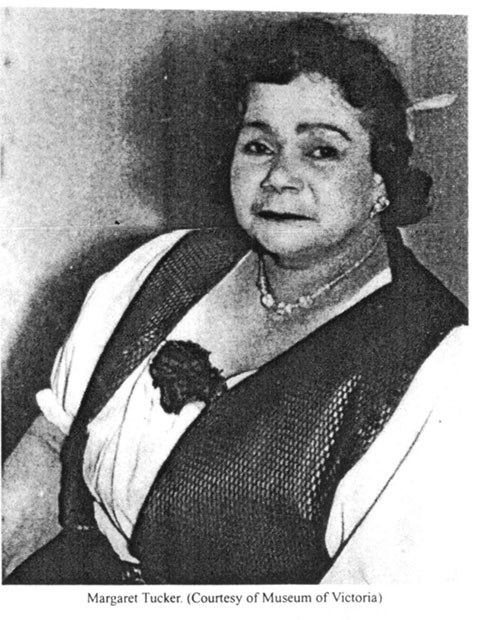
Marion Martin
Marion Martin was a Mayor of Sunshine in 1993 after running as an Independent candidate. She has worked as an occupational therapy assistant at North West Hospital for the Aged for 13 years. Her family moved to Deer Park from Footscray for a quieter environment and more space for their children as they grew up. A five year fight to prevent a chemical storage site being established opposite her Deer Park home prompted Marion to seek a seat on Council. She was a member of the Resident’s Association in Deer Park. When she joined Council in 1989, she felt that St. Albans, Albanvale and Deer Park were not getting enough representation. She is currently Chairperson of the Police Community Consultative Committee, and a committee member of the Drug Task Force. She is on the Board of Management of Howard Kingham Lodge, Burnside St. Nursing Home, Grantham Green Hostel, Past Interim President of Brimbank Community Health Centre and Past Vice-President of Deer Park Lions Club.
The people of the west are no longer putting up with junk being dumped on their doorsteps. They are educated and just as aware of surroundings as people anywhere.
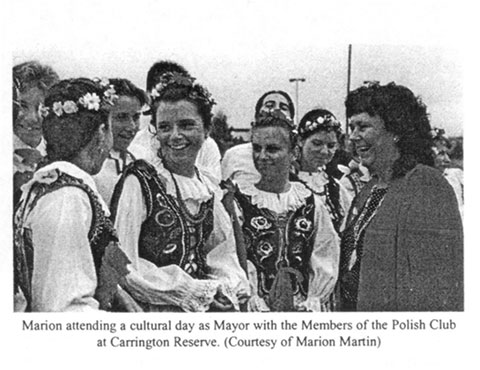
Kathleen Mary Aitken nee Douglass
Kathleen Douglass was of Scottish descent born in 1900 in Victoria. Her parents were sheep farmers and graziers and her early years were spent on the land. Kathleen’s father died in 1919 and in 1921 she moved with her mother and sister to live in Sunbury. As an adult, Kathleen was involved in the Red Cross and the Country Women’s Association. She worked as secretary and then as Group President for the Central Highlands CWA. She was awarded an MBE in 1964 for her charitable work. Kathleen worked for the establishment of a Guide Hall and an Infant Welfare Centre in Sunbury. She was the first woman elder to be appointed to St. Andrew’s Presbyterian, now Uniting Church in Sunbury. She did things quietly without fanfare.
I did… all the jobs that I was allotted… getting the hen s eggs, they lay away whenever they wanted to, they were never closed up, they were white leghorns and they ‘d set themselves when they ‘d laid enough eggs and raise their own chickens.
There was the Red Cross, yes … and the CWA, although we were not really established with the CWA till 1938. It was a real sort of country – women thing, sort of helping one another as women. We had an aim to help country women. Country people have been brought up differently, we try to get them involved and friendly.
(Douglass Tremlett thesis 1980)
Kathleen and her daughter enjoying a day in town {Courtesy of Mrs Tremlett)
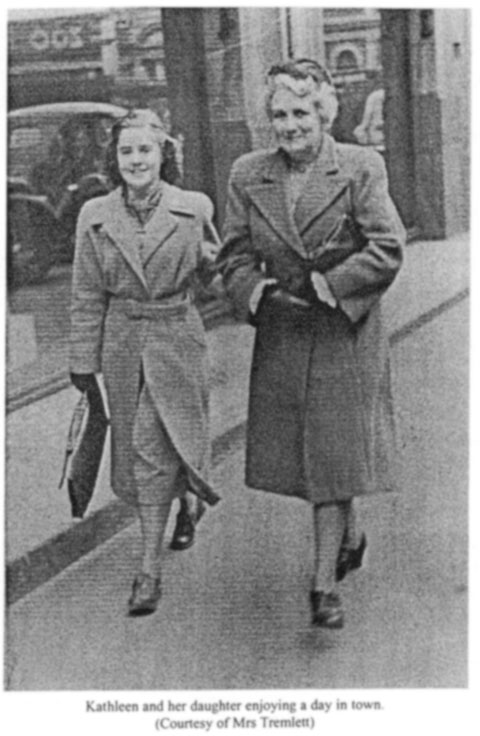
Lynne Kosky
Lynne Kosky was brought up in the west. She trained as a social worker and became involved in community education in schools. She has always been vocal in her work to improve conditions for people in the west and was encouraged to become involved in local politics by local parents and politicians. She has been involved with issues such as saving the Footscray Football Club, moving the Coode Island chemical terminal and the Melbourne Olympic Bid. She went on to become Mayor of Footscray in 1989, a state politician as Member for Altona and Opposition Spokesperson for Employment, Training, Tertiary Education and Youth Affairs. She feels that the nature of the west is changing – a growing assertiveness, a sensitivity to the environment, a resistance to decisions affecting the area made by people who live elsewhere. She believes that you convince people through your actions.
The west has always been an area of Melbourne that has been disadvantaged and had poorer people living there … [and it has a history of being a dumping ground… [and it has] taken a long time for the western suburbs to be seen in any positive light. It’s an area that has a lot of strength, it has a lot of people who struggle in their day to day lives … have people who have the energy and time to take on bigger struggles.
I’m committed to supporting and encouraging other women to take on challenges and move into areas that they are interested in but lack the confidence to do.
I ‘d rather be an optimist and wrong than a pessimist and right. I ‘ll give things a go. It s taken a long time to have the western suburbs seen in any positive light. It s an area with a lot of strength. There is a real sense of community.
(Gandoifo manuscript)
